2022届高三英语二轮复习名词性从句之表语从句及同位语从句课件(65张ppt)
文档属性
| 名称 | 2022届高三英语二轮复习名词性从句之表语从句及同位语从句课件(65张ppt) |  | |
| 格式 | zip | ||
| 文件大小 | 8.4MB | ||
| 资源类型 | 教案 | ||
| 版本资源 | 通用版 | ||
| 科目 | 英语 | ||
| 更新时间 | 2022-03-21 19:56:43 | ||
图片预览


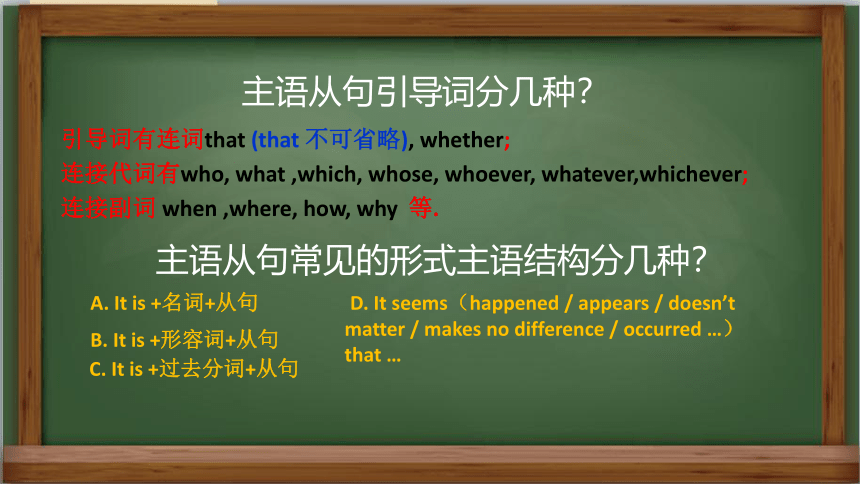
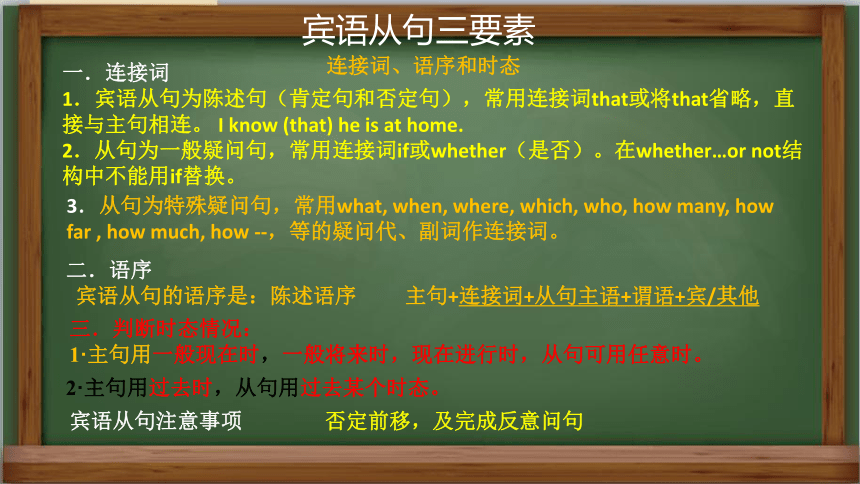
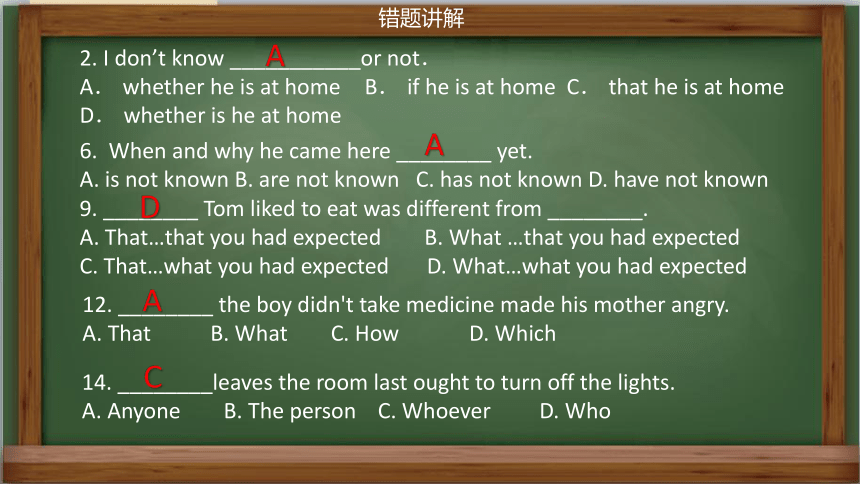
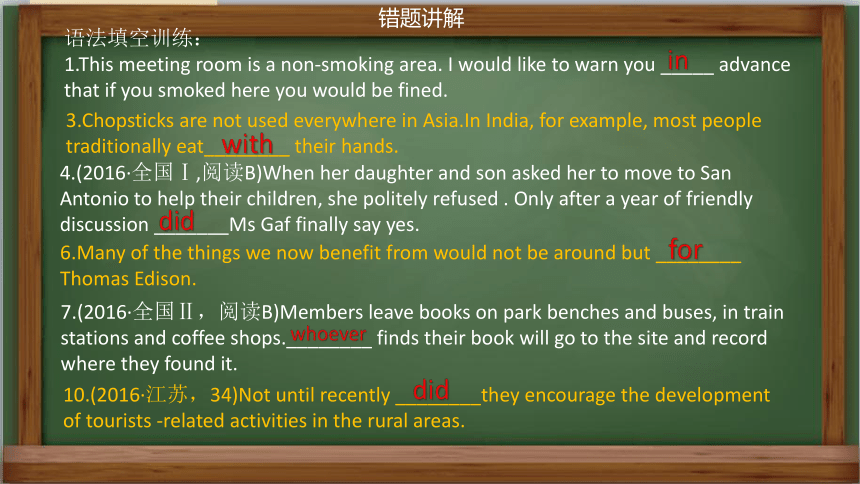



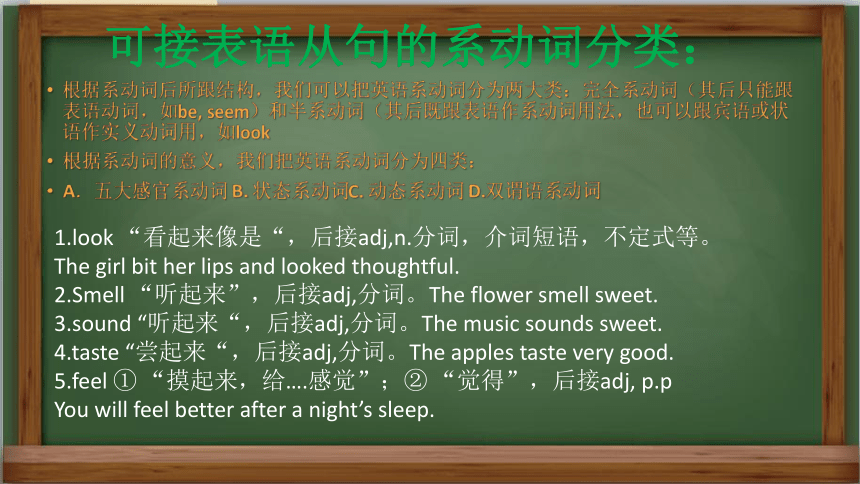
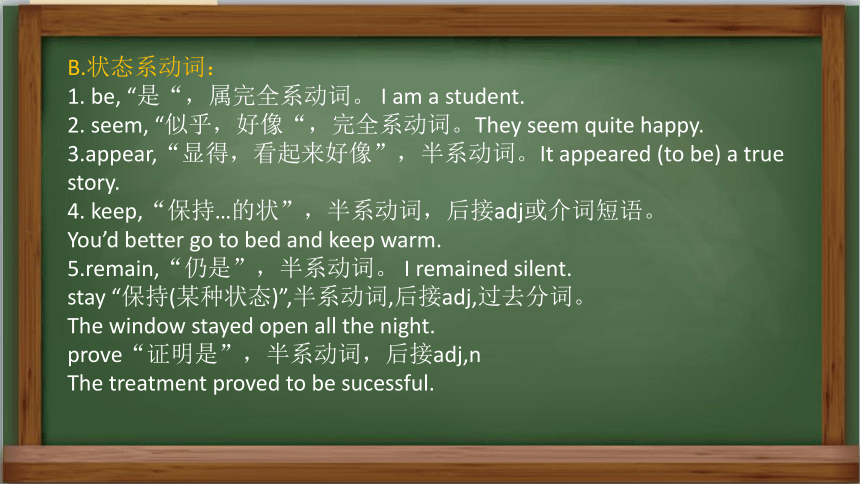
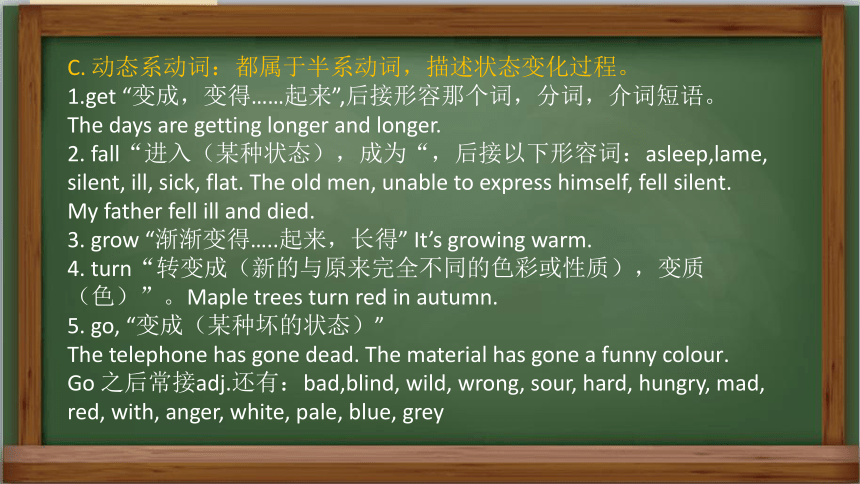
文档简介
(共65张PPT)
语
法
项
专
高中英语语法课专项讲解与练习
目录
contents
复习主、宾从
表语从句
同位语从句
教学总结
主语从句引导词分几种?
引导词有连词that (that 不可省略), whether;
连接代词有who, what ,which, whose, whoever, whatever,whichever;
连接副词 when ,where, how, why 等.
主语从句常见的形式主语结构分几种?
A. It is +名词+从句
B. It is +形容词+从句
C. It is +过去分词+从句
D. It seems(happened / appears / doesn’t matter / makes no difference / occurred …)that …
宾语从句三要素
连接词、语序和时态
一.连接词
1.宾语从句为陈述句(肯定句和否定句),常用连接词that或将that省略,直接与主句相连。 I know (that) he is at home.
2.从句为一般疑问句,常用连接词if或whether(是否)。在whether…or not结构中不能用if替换。
3.从句为特殊疑问句,常用what, when, where, which, who, how many, how far , how much, how --,等的疑问代、副词作连接词。
二.语序
宾语从句的语序是:陈述语序 主句+连接词+从句主语+谓语+宾/其他
三.判断时态情况:
1·主句用一般现在时,一般将来时,现在进行时,从句可用任意时。
2·主句用过去时,从句用过去某个时态。
宾语从句注意事项 否定前移,及完成反意问句
2. I don’t know ___________or not.
A. whether he is at home B. if he is at home C. that he is at home D. whether is he at home
6. When and why he came here ________ yet.
A. is not known B. are not known C. has not known D. have not known
9. ________ Tom liked to eat was different from ________.
A. That…that you had expected B. What …that you had expected
C. That…what you had expected D. What…what you had expected
12. ________ the boy didn't take medicine made his mother angry.
A. That B. What C. How D. Which
14. ________leaves the room last ought to turn off the lights.
A. Anyone B. The person C. Whoever D. Who
错题讲解
A
A
D
A
C
错题讲解
in
语法填空训练:
1.This meeting room is a non smoking area. I would like to warn you _____ advance that if you smoked here you would be fined.
3.Chopsticks are not used everywhere in Asia.In India, for example, most people traditionally eat________ their hands.
4.(2016·全国Ⅰ,阅读B)When her daughter and son asked her to move to San Antonio to help their children, she politely refused . Only after a year of friendly discussion _______Ms Gaf finally say yes.
6.Many of the things we now benefit from would not be around but ________ Thomas Edison.
7.(2016·全国Ⅱ,阅读B)Members leave books on park benches and buses, in train stations and coffee shops.________ finds their book will go to the site and record where they found it.
10.(2016·江苏,34)Not until recently ________they encourage the development of tourists -related activities in the rural areas.
with
did
for
whoever
did
表语从句
表语从句:在复合句中做表语的从句,叫做表语从句。它位于主句的系动词am , is, are, was, were, seem, look, taste, remain等之后,对主语进行解释,说明,使主语的内容具体化。
The question is who will do it.
表语从句放在连系动词之后,充当复合句中的表语。
The question is who will do it.
The question is difficult.
( 表 )
表语从句
( 表 )
可接表语从句的系动词分类:
根据系动词后所跟结构,我们可以把英语系动词分为两大类:完全系动词(其后只能跟表语动词,如be, seem)和半系动词(其后既跟表语作系动词用法,也可以跟宾语或状语作实义动词用,如look
根据系动词的意义,我们把英语系动词分为四类:
A.五大感官系动词 B. 状态系动词C. 动态系动词 D.双谓语系动词
1.look “看起来像是“,后接adj,n.分词,介词短语,不定式等。
The girl bit her lips and looked thoughtful.
2.Smell “听起来”,后接adj,分词。The flower smell sweet.
3.sound “听起来“,后接adj,分词。The music sounds sweet.
4.taste “尝起来“,后接adj,分词。The apples taste very good.
5.feel ① “摸起来,给….感觉”;② “觉得”,后接adj, p.p
You will feel better after a night’s sleep.
B.状态系动词:
1. be, “是“,属完全系动词。 I am a student.
2. seem, “似乎,好像“,完全系动词。They seem quite happy.
3.appear,“显得,看起来好像”,半系动词。It appeared (to be) a true story.
4. keep,“保持…的状”,半系动词,后接adj或介词短语。
You’d better go to bed and keep warm.
5.remain,“仍是”,半系动词。 I remained silent.
stay “保持(某种状态)”,半系动词,后接adj,过去分词。
The window stayed open all the night.
prove“证明是”,半系动词,后接adj,n
The treatment proved to be sucessful.
C. 动态系动词:都属于半系动词,描述状态变化过程。
1.get “变成,变得……起来”,后接形容那个词,分词,介词短语。
The days are getting longer and longer.
2. fall“进入(某种状态),成为“,后接以下形容词:asleep,lame, silent, ill, sick, flat. The old men, unable to express himself, fell silent.
My father fell ill and died.
3. grow “渐渐变得…..起来,长得” It’s growing warm.
4. turn“转变成(新的与原来完全不同的色彩或性质),变质(色)”。Maple trees turn red in autumn.
5. go, “变成(某种坏的状态)”
The telephone has gone dead. The material has gone a funny colour.
Go 之后常接adj.还有:bad,blind, wild, wrong, sour, hard, hungry, mad, red, with, anger, white, pale, blue, grey
C. 动态系动词:都属于半系动词,描述状态变化过程。
6. become”变成,成为(好坏均可的情况)”
I became interested in drawing. He became angry with me.
They became good friends.
7.come, “变成为(已知的状态),证实为”,后接形容词或前缀un-的过去分词作表语,表示状态或情况的变化。
His wish to become a pilot has come true.
后面接的形容词还有apart ,near ,natural , short, right,.
8.run “变成”,后接adj. The price ran high.
9.make, “达到某种状态,后接形容词,如:sure, certain, merry, bold, free. We must make certain of facts.
D. 双谓语系动词 此类系动词既有系动词功能,后接表语,又保留原实义动词本身的含义。
The sun rose red. She stopped and stood quite still.
The snow lay thick on the ground. He married young.
Lei Feng died young. He continued silent.
1. 这个故事听起来像是真的。
The story sounds true.
2. 他似乎知道这件事。
He appears to know this.
例句:
3. 这些桔子很好吃。
These oranges taste good.
1. This is an English-Chinese dictionary.
2. The dinner smells good.
3. He fell in love.
4. The machine runs smoothly.
5. The question is who will do it.
2. 表语从句的构成
主语 + 系动词 + 引导词 + 简单句
This is why he did it.
表语从句放在连系动词之后,充当复合句中的表语。
His suggestion is that we should stay calm.
That is why she was late.
引导词
引导词
(系动词) +
引导词 +
简单句
(主语) +
What I want to say is that I am tired
主语 + 系动词 + 引导词 + 简单句
观察思考:
指出句子成分
Henry was an American businessman.
Henry met an American businessman.
主语
表语
主语
谓语
宾语
(及物动词)
连系动词
3. 表语从句的引导词
从属连词that, whether, as though, as if, because(That引导表语从句时,在口语中,间或可以省略.)
连接代词who, what, which, whom, whose, whatever, whoever, whomever, whichever等;
连接副词when, where, why, how, however, whenever, wherever等.
1. that
1) that 在从句中不担任句子成分,无实际意义,一般不能省略
2)在表“建议,劝说,命令”的名词idea, suggestion, request, proposal 等后面的表语从句中,谓语动词用“should + 动词原形”(虚拟语气),should可省略
My opinion is that it’s getting better and better.
My suggestion is that we (should) start early tomorrow.
从属连词(一)
名词主语+be+that引起的表语从句
主语名词常常是
表示事实,真理的名词,如:fact, truth 表示看法,观点、问题、麻烦的名词,如:idea, opinion, belief, view, news, advice, feeling, suggestion, plan, trouble, question, problem,
1.The fact is that our team has won the game.
2.The truth is that she was the very person we are looking for.
whether在表语从句中表 ,但不充当句子的成分。if 引导表语从句.如:
1.What the doctor really doubts is whether my mother will recover from the serious disease soon.
2. The question is whether it is worth doing.
“是否”
不能
从属连词(二)
as if/though引导的表语从句常置于连系动词look, seem, sound, be, become等后面,常用虚拟语气,表示不存在的动作或状态。
e.g. It sounds as if/though somebody was knocking at the door.
主语+连系动词(look /seem /appear…)+that/as if从句
从属连词(三)as if, as though 引导的表语从句
*as if/as though引导的表语从句如果是事实,就用陈述语气,如果与事实不符,就用虚拟语气(主句一般现在时,从句就用一般过去时,be变成were。主句是一般过去时,从句用过去完成时)。
It looks as if he were her own father.
(与事实不符)
Dark clouds are gathering. It looks as if it’s going to rain.
从属连词as, as if / though引导的表语从句
He looked just as he had looked ten years before.
It sounds as if someone is knocking at the door.
他看起来还与十年前一样。
听起来好像有人在敲门。
because
because引导表语从句通常用于“This/That/It is because…”结构中。而且主语一般不用reason。
My anger is because you haven’t written to me for a long time.
Why were you absent from the meeting Was it because you were ill
你为什么不来出席座谈会?是病了么?
从属连词(四)
that, why 与 because 引导表语从句时的区别
三者均可引导表语从句,但 that 没有词义,而 why 和 because 有自己的意思;另外,前者强调结果,后者强调原因。如:
The reason was that you don’t trust her. 原因是你不信任她。
The fact is that they are angry with each other. 事实是他们生彼此的气。
He was ill. That’s why he was sent to the hospital. 他病了,所以被送到医院来。
He was sent to the hospital. That’s because he was ill. 他被送到医院,是因为他生病了。
例句:
(1) That’s because he didn’t
understand me.
(2) That’s why he got angry with me .
那是因为他不理解我。
那正是他对我生气的原因。
(强调原因)
(强调结果)
连接代词who, whom, whose, whoever, what, whatever, which, whichever,连接副词where, when, how,在句中作主语、宾语、表语,连接代词不能省略。
(1) The problem is who we can get to replace her.
(2) The question is how he did it.
(3) That is where he was born.
问题是我们能找到谁去替换她呢。
问题是他如何做此事的。
那就是他出生的地方。
连接连词
what 在表语从句中充当______________ 表示____________________________.
1. The question is what caused the accident.
2. That mountain is no longer what it used to be .
3. What he told you was what had been discussed at the meeting.
主语、宾语或表语
什么,什么样子,或所…的(人或事)
连接连词(一)
who 在表语从句中充当______________表示____.
The problem is who could do the work
2. My trouble is who (whom) I can turn to.
主语、宾语或表语
谁
连接连词(二)
which 在引导表语从句时,常充当_____________
表示 。如:
I read about it in some book or another,but what I don’t know is which (book) it is.
定语,表语
其中哪一个
连接连词(三)
where, when, why, how引导的表语从句
连接副词where, when, why, how除在句中起连接作用外,在从句中还充当时间、地点、方式、原因状语,本身具有词义。
That’s where I can’t agree with you.
This is why Sara was late for the meeting.
This is how they overcome the difficulties.
My strongest memory is when I attended an American wedding.
连接副词
填空: The reason why we didn't trust him is ______ he has often lied.
reason 做主语时,表语从句只能用that引导, 不能用why 引导。句型结构为:
The reason (why…/for…)is /was that….
The reason is that……
that
The reason why he was late was that he missed the train by one minute this morning (当主语是reason时,表语从句要用that引导而不是because)
他早上来晚的原因是他晚了一分钟而没赶上火车。
表语从句的虚拟语气
1. 主语为advice, order, idea, notion, proposal, suggestion, request等一些表示“建议,劝说,命令”的名词,之后的表语从句中,谓语动词用虚拟语气。Should+动词原形表示,should可省略。
My suggestion is that we (should) start early tomorrow.
Our only request is that this should be settled as soon as possible.
2. as if / though引导的表语从句时,从句谓语多用虚拟语气。这是因为从句中的情况与事实不相符。
具体来说,如果从句表示与现在事实相反,谓语动词用一般过去式;如果从句表示与过去事实相反,谓语动词“had+done”,如果从句表示将来的可能性不大,用would(might, could)+动词原形。
Li Lei is now in a new jacket he looks as if he were an American boy.
The girl is giving us a vivid description of the moon.
但是,如果as if, as though引导的表语从句所表示的与事实相符,从句则用陈述语气。The clouds are gathering. It looks as if it is going to rain.
表语从句的时态
时态 不像宾语从句,在有表语从句的复合句中,主语时态和从句时态可以不一致。
The question is who will travel with me to Beijing tomorrow.
The question is why he cried yesterday.
表语从句引导词注意事项
1. that引导表语从句时不能省.
2. if不能引导表语从句.
3. 除that外的所有引导词都有自己的意义。
4. 除that, whether外的所有引导词都须在从句中充当相应的成分
5.表语从句中,从句用陈述句语序
小结:
1. 表语从句的构成:
引导词+简单句
2. 引导词:
{
连词that, whether, as ,as if
连接代词who, what, which
连接副词when, where, how ,why
3. 3个注意点:
①if 不引导表语从句
②主语为reason时,引导词用that
③语序
例题1:
The question is ________ we will have our sports meeting next week.
A. that B. if C. when D. whether
D
注意点1:if 不能引导表语从句
例题 2:
The reason why he failed is ________he was too careless.
A. because B. that
C. for D. because of
B
注意点2:
主句主语为reason, 只能用that引导表语从句,不可用because.
用because, that, why填空
1、The reason was ______ the heavy rain prevented him from coming.
2、The reason ________we didn’t trust him is that he has often lied.
3、It is _______ he has often lied,so that we didn’t trust him.
注意点3:reason后的定语从句可以用why/that引导,because一般用于it/this/that+从句句型中。
that
why
because
注意点4:
如果从句是特殊疑问句,用陈述句语序
The problem is _________to take the place of John.
A. who can we get B. what we can get
C. who we can get D. that we can get
C
1. Go and get your coat. It’ s ________you left it.
A. where B. there
C. there where D. where there
2. The reason why he hasn’t come is ___________.
A. because his mother is ill
B. because of his mother’s being ill
C. that his mother is ill
D. for his mother is ill
A
C
3. That is _____ we were late last time.
A. that B. when
C. why D. what
4. _______your father wants to know is________ getting on with your studies.
A. What; how are you
B. That;how you are
C. How;that you are
D. What;how you are
C
D
1. The question is ________ we will have our sports meet next week.
that B. if C. when D. whether
2.The reason why he failed is ________he was too careless.
because B. that C. for D. because of
3. Go and get your coat. It’ s ________you left it
where B. there
C. there where D. where there
D
B
C
4.The problem is _________to take the place of Ted
A. who can we get B. what we can get
C. who we can get D. that we can get
5. What I want to know is ______ he likes the gift given by us.
that B. if C. whether D.不填
6. The reason is _________I missed the bus.
A. that B. when C. why D. what
C
C
A
7.The problem is_______ he has enough time.
A. if B. whether C./ D. that
11.He made a promise_______ he would help me.
A. what B. when C. that D. which
8.I remember_______ this used to be a quiet village.
A. how B. when C. where D. what
9.It is generally considered unwise to give a child_______ he or she wants. A. however B. whatever C. whichever D. wherever
B
C
B
B
同位语从句
同位语从句是用以解释说明某一抽象名词内容的从句,常见的可以被同位语从句修饰的名词有:belief, chance, doubt, hope, idea, news, opinion, thought, promise等。
名词作同位语
Mr Wang, my child’s teacher, will be visiting us on Tuesday.王先生,我孩子的老 师,星期二要来看我们。
2.短语作同位语
I, the oldest girl in the family, always had to care for the other children.我,作为家里最大的女孩,老得照料家中的其他孩子。
3. 直接引语作同位语
But now the question comes to their minds, “Did she die young because she was a clone ”但是现在他们不得不思考这样的问题:“多莉早死是因为它是一只克隆羊吗?”
4. 句子作同位语
The girls were surprised at the fact that ocean ships can sail up the Great lakes.巨大的海轮可以开到五大湖,让表姐妹俩感到吃惊。
一、同位语的分类
可以跟同位语从句的名词通常有news,idea,fact,promise,question,doubt,thought,hope,message,suggestion,words(消息),possibility等抽象名词。
Eg: I’ve come from Mr wang with a message that he won’t be able to see you this afternoon.
How did the cheats explain the fact that the Emperor didn't feel the new clothes in him
二、同位语从句先行词
英语中引导同位语从句的词通有连词 that,whether,连接代词和连接副词 how,when,where等。(注:if,which 不能引导同位语从句。)
Eg:He must answer the question whether he agrees to it or not.
有时同位语从句可以不紧跟在说明的名词后面,而被别的词隔开。
Eg:The thought came to him that maybe the enemy had fled the city.
三、同位语从句引导词
1. 连词that引导同位语从句
(注:引导同位语从句的that不能省略)
The idea that you can do this work well without thinking is quite wrong. 。(作idea的同位语)
【注意1】在某些名词(如demand, wish, suggestion, resolution等)后面的同位语从句要用虚拟语气
There was a suggestion that Brown should be dropped from the team.
【注意2】引导同位语从句的连词that通常不省略,但在非正式文体中也可以省去。
He gabbed his suitcase and gave the impression he was boarding the Tokyo plane.
三、同位语从句引导词
2. 连词whether引导同位语从句 (注:if不能引导同位语从句)
The question whether we should call in a specialist was answered by the family doctor.
【注意】whether 可引导同位语从句,但if不能引导同位语从句。
其它引导词引导的同位语从句
连接代词what, who, whom, whose, which引导同位语从句
1).I have no idea what size shoes she wears.
2).I have no idea which wine is best—it’s a matter of personal taste.
3).The question who will take his place is still not clear.
(what作定语)
(which作定语)
(who作主语)
三、同位语从句引导词
3. 连接副词引导同位语从句 连接副词when, where, how, why
We haven’t yet settled the question where we are going to spend our summer vacation.
I have no idea when we will have a long holiday.
三、同位语从句引导词
四、同位语从句与定语从句的区别
1.意义的不同
同位语从句是用于说明所修饰名词的具体内容的,它与被修饰词语通常可以划等号;而定语从句是限制所修饰名词的,它的作用是将所修饰的名词与其他类似的东西区别开来:
We are glad at the news that he will come. 听到他要来这个消息我们很高兴。(news的内容就是that he will come,故that引导的是同位语从句)
We are glad at the news that he told us. 听到他告诉我们的这个消息我们很高兴。(that从句是限制the news的内容的,即我们高兴只是因为他告诉的这个news而不是其他的news,故that从句为定语从句)
四、同位语从句与定语从句的区别
2. 引导词的不同
what, how, if, whatever 等可引导名词性从句,但不引导定语从句。
who, whom, whose, when, where, why 引导定语从句,它们分别指前面先行词所表示的人、物、时间、地点、原因,否则为同位语从句。在同位语从句中,wh-类词表示疑问。
I will forever cherish the time when I won the prize in the National Maths Competition.
I have no idea when he won the prize in the National Maths Competition.
四、同位语从句与定语从句的区别
3. 引导词的功能上的不同
that引导同位语从句时,为连接词,它不充当句子成分,也不能省略。而that引导定语从句时,它作为关系代词,要么充当定语从句的主语,要么充当定语从句的宾语。指物时有时还可以用which来代替。
The news that he told us just now is unbelievable.
But they forget the fact that Canada is 5,500 kilometers from coast to coast.
四、同位语从句与定语从句的区别
4. 被修饰词语的区别
同位语从句所修饰的名词比较有限,通常有hope, wish, idea, news, fact, promise, opinion, suggestion, truth等抽象名词,而定语从句所修饰的名词则非常广泛。 另外,when和where 引导定语从句时,通常只修饰表示时间和地点的名词,而它们引导同位语从句时却不一定;又如why引导定语从句,它通常只修饰名词the reason,而它引导同位语从句时则不一定:
I have no idea when they will come .
I’ll never forget the days when I lived there.
四、同位语从句与定语从句的区别
5.一些表示“建议、命令、要求”的名词后所跟的同位语从句中,谓语动词用虚拟语气should+动词原形表示。should可省。如:
This is our only request that this (should) be settled as soon as possible.这
五、同位语从句特殊句式
1.间隔同位语从句
同位语从句通常是跟在它解释或说明的名词后,但有些情况下,由于句子结构的原因,同位语从句不紧跟在名词后,而被其他的词隔开。
A warm thought suddenly came to me that I might use the pocket money to buy some flowers for my mother's birthday
简析:由于that从句太长,为避免句子失去平衡,此处用了间隔同位语从句
五、同位语从句特殊句式
2.suggestion,request和order等名词后的同位语从句用虚拟语气。
She made a request that the doctor(should)be sent for at once.
简析:suggestion,order,request,proposal,requirement,command,advice,proposition和recommendation等名词后接同位语从句时,从句中的谓语动词要用“(should+)动词原形”的形式,其中should一词可省略。
五、同位语从句特殊句式
3.短语及固定句式后的同位语从句
I will come on condition that John is invited.
简析:短语On condition , on supposition, on the ground(s), on the understanding, with the exception, in spite of the fact, on the assumption
及句式There be + no doubt(hope, chance, possibility,…)后的that从句为同位语从句。
只要,若是 ;
由于…原因
假设
如果,在…条件下
除了…情况
尽管事实上
在…的假设下
用适当的连接词填空:
1. He often asked me the question ______ the work was worth doing.
2.I have no idea _______ we can do with these waste materials.
3.________ was the idea _______ the wife thought of. 4.The king was so clever that he thought of a good way to test _______ his men were reliable.
5.For ten years, there was no evidence ____ this figure existed.
whether
what
That
what
whether
that
谢
谢
看
观
教育教学/教学汇报/教学设计/教学培训
讲师 / XXX
语
法
项
专
高中英语语法课专项讲解与练习
目录
contents
复习主、宾从
表语从句
同位语从句
教学总结
主语从句引导词分几种?
引导词有连词that (that 不可省略), whether;
连接代词有who, what ,which, whose, whoever, whatever,whichever;
连接副词 when ,where, how, why 等.
主语从句常见的形式主语结构分几种?
A. It is +名词+从句
B. It is +形容词+从句
C. It is +过去分词+从句
D. It seems(happened / appears / doesn’t matter / makes no difference / occurred …)that …
宾语从句三要素
连接词、语序和时态
一.连接词
1.宾语从句为陈述句(肯定句和否定句),常用连接词that或将that省略,直接与主句相连。 I know (that) he is at home.
2.从句为一般疑问句,常用连接词if或whether(是否)。在whether…or not结构中不能用if替换。
3.从句为特殊疑问句,常用what, when, where, which, who, how many, how far , how much, how --,等的疑问代、副词作连接词。
二.语序
宾语从句的语序是:陈述语序 主句+连接词+从句主语+谓语+宾/其他
三.判断时态情况:
1·主句用一般现在时,一般将来时,现在进行时,从句可用任意时。
2·主句用过去时,从句用过去某个时态。
宾语从句注意事项 否定前移,及完成反意问句
2. I don’t know ___________or not.
A. whether he is at home B. if he is at home C. that he is at home D. whether is he at home
6. When and why he came here ________ yet.
A. is not known B. are not known C. has not known D. have not known
9. ________ Tom liked to eat was different from ________.
A. That…that you had expected B. What …that you had expected
C. That…what you had expected D. What…what you had expected
12. ________ the boy didn't take medicine made his mother angry.
A. That B. What C. How D. Which
14. ________leaves the room last ought to turn off the lights.
A. Anyone B. The person C. Whoever D. Who
错题讲解
A
A
D
A
C
错题讲解
in
语法填空训练:
1.This meeting room is a non smoking area. I would like to warn you _____ advance that if you smoked here you would be fined.
3.Chopsticks are not used everywhere in Asia.In India, for example, most people traditionally eat________ their hands.
4.(2016·全国Ⅰ,阅读B)When her daughter and son asked her to move to San Antonio to help their children, she politely refused . Only after a year of friendly discussion _______Ms Gaf finally say yes.
6.Many of the things we now benefit from would not be around but ________ Thomas Edison.
7.(2016·全国Ⅱ,阅读B)Members leave books on park benches and buses, in train stations and coffee shops.________ finds their book will go to the site and record where they found it.
10.(2016·江苏,34)Not until recently ________they encourage the development of tourists -related activities in the rural areas.
with
did
for
whoever
did
表语从句
表语从句:在复合句中做表语的从句,叫做表语从句。它位于主句的系动词am , is, are, was, were, seem, look, taste, remain等之后,对主语进行解释,说明,使主语的内容具体化。
The question is who will do it.
表语从句放在连系动词之后,充当复合句中的表语。
The question is who will do it.
The question is difficult.
( 表 )
表语从句
( 表 )
可接表语从句的系动词分类:
根据系动词后所跟结构,我们可以把英语系动词分为两大类:完全系动词(其后只能跟表语动词,如be, seem)和半系动词(其后既跟表语作系动词用法,也可以跟宾语或状语作实义动词用,如look
根据系动词的意义,我们把英语系动词分为四类:
A.五大感官系动词 B. 状态系动词C. 动态系动词 D.双谓语系动词
1.look “看起来像是“,后接adj,n.分词,介词短语,不定式等。
The girl bit her lips and looked thoughtful.
2.Smell “听起来”,后接adj,分词。The flower smell sweet.
3.sound “听起来“,后接adj,分词。The music sounds sweet.
4.taste “尝起来“,后接adj,分词。The apples taste very good.
5.feel ① “摸起来,给….感觉”;② “觉得”,后接adj, p.p
You will feel better after a night’s sleep.
B.状态系动词:
1. be, “是“,属完全系动词。 I am a student.
2. seem, “似乎,好像“,完全系动词。They seem quite happy.
3.appear,“显得,看起来好像”,半系动词。It appeared (to be) a true story.
4. keep,“保持…的状”,半系动词,后接adj或介词短语。
You’d better go to bed and keep warm.
5.remain,“仍是”,半系动词。 I remained silent.
stay “保持(某种状态)”,半系动词,后接adj,过去分词。
The window stayed open all the night.
prove“证明是”,半系动词,后接adj,n
The treatment proved to be sucessful.
C. 动态系动词:都属于半系动词,描述状态变化过程。
1.get “变成,变得……起来”,后接形容那个词,分词,介词短语。
The days are getting longer and longer.
2. fall“进入(某种状态),成为“,后接以下形容词:asleep,lame, silent, ill, sick, flat. The old men, unable to express himself, fell silent.
My father fell ill and died.
3. grow “渐渐变得…..起来,长得” It’s growing warm.
4. turn“转变成(新的与原来完全不同的色彩或性质),变质(色)”。Maple trees turn red in autumn.
5. go, “变成(某种坏的状态)”
The telephone has gone dead. The material has gone a funny colour.
Go 之后常接adj.还有:bad,blind, wild, wrong, sour, hard, hungry, mad, red, with, anger, white, pale, blue, grey
C. 动态系动词:都属于半系动词,描述状态变化过程。
6. become”变成,成为(好坏均可的情况)”
I became interested in drawing. He became angry with me.
They became good friends.
7.come, “变成为(已知的状态),证实为”,后接形容词或前缀un-的过去分词作表语,表示状态或情况的变化。
His wish to become a pilot has come true.
后面接的形容词还有apart ,near ,natural , short, right,.
8.run “变成”,后接adj. The price ran high.
9.make, “达到某种状态,后接形容词,如:sure, certain, merry, bold, free. We must make certain of facts.
D. 双谓语系动词 此类系动词既有系动词功能,后接表语,又保留原实义动词本身的含义。
The sun rose red. She stopped and stood quite still.
The snow lay thick on the ground. He married young.
Lei Feng died young. He continued silent.
1. 这个故事听起来像是真的。
The story sounds true.
2. 他似乎知道这件事。
He appears to know this.
例句:
3. 这些桔子很好吃。
These oranges taste good.
1. This is an English-Chinese dictionary.
2. The dinner smells good.
3. He fell in love.
4. The machine runs smoothly.
5. The question is who will do it.
2. 表语从句的构成
主语 + 系动词 + 引导词 + 简单句
This is why he did it.
表语从句放在连系动词之后,充当复合句中的表语。
His suggestion is that we should stay calm.
That is why she was late.
引导词
引导词
(系动词) +
引导词 +
简单句
(主语) +
What I want to say is that I am tired
主语 + 系动词 + 引导词 + 简单句
观察思考:
指出句子成分
Henry was an American businessman.
Henry met an American businessman.
主语
表语
主语
谓语
宾语
(及物动词)
连系动词
3. 表语从句的引导词
从属连词that, whether, as though, as if, because(That引导表语从句时,在口语中,间或可以省略.)
连接代词who, what, which, whom, whose, whatever, whoever, whomever, whichever等;
连接副词when, where, why, how, however, whenever, wherever等.
1. that
1) that 在从句中不担任句子成分,无实际意义,一般不能省略
2)在表“建议,劝说,命令”的名词idea, suggestion, request, proposal 等后面的表语从句中,谓语动词用“should + 动词原形”(虚拟语气),should可省略
My opinion is that it’s getting better and better.
My suggestion is that we (should) start early tomorrow.
从属连词(一)
名词主语+be+that引起的表语从句
主语名词常常是
表示事实,真理的名词,如:fact, truth 表示看法,观点、问题、麻烦的名词,如:idea, opinion, belief, view, news, advice, feeling, suggestion, plan, trouble, question, problem,
1.The fact is that our team has won the game.
2.The truth is that she was the very person we are looking for.
whether在表语从句中表 ,但不充当句子的成分。if 引导表语从句.如:
1.What the doctor really doubts is whether my mother will recover from the serious disease soon.
2. The question is whether it is worth doing.
“是否”
不能
从属连词(二)
as if/though引导的表语从句常置于连系动词look, seem, sound, be, become等后面,常用虚拟语气,表示不存在的动作或状态。
e.g. It sounds as if/though somebody was knocking at the door.
主语+连系动词(look /seem /appear…)+that/as if从句
从属连词(三)as if, as though 引导的表语从句
*as if/as though引导的表语从句如果是事实,就用陈述语气,如果与事实不符,就用虚拟语气(主句一般现在时,从句就用一般过去时,be变成were。主句是一般过去时,从句用过去完成时)。
It looks as if he were her own father.
(与事实不符)
Dark clouds are gathering. It looks as if it’s going to rain.
从属连词as, as if / though引导的表语从句
He looked just as he had looked ten years before.
It sounds as if someone is knocking at the door.
他看起来还与十年前一样。
听起来好像有人在敲门。
because
because引导表语从句通常用于“This/That/It is because…”结构中。而且主语一般不用reason。
My anger is because you haven’t written to me for a long time.
Why were you absent from the meeting Was it because you were ill
你为什么不来出席座谈会?是病了么?
从属连词(四)
that, why 与 because 引导表语从句时的区别
三者均可引导表语从句,但 that 没有词义,而 why 和 because 有自己的意思;另外,前者强调结果,后者强调原因。如:
The reason was that you don’t trust her. 原因是你不信任她。
The fact is that they are angry with each other. 事实是他们生彼此的气。
He was ill. That’s why he was sent to the hospital. 他病了,所以被送到医院来。
He was sent to the hospital. That’s because he was ill. 他被送到医院,是因为他生病了。
例句:
(1) That’s because he didn’t
understand me.
(2) That’s why he got angry with me .
那是因为他不理解我。
那正是他对我生气的原因。
(强调原因)
(强调结果)
连接代词who, whom, whose, whoever, what, whatever, which, whichever,连接副词where, when, how,在句中作主语、宾语、表语,连接代词不能省略。
(1) The problem is who we can get to replace her.
(2) The question is how he did it.
(3) That is where he was born.
问题是我们能找到谁去替换她呢。
问题是他如何做此事的。
那就是他出生的地方。
连接连词
what 在表语从句中充当______________ 表示____________________________.
1. The question is what caused the accident.
2. That mountain is no longer what it used to be .
3. What he told you was what had been discussed at the meeting.
主语、宾语或表语
什么,什么样子,或所…的(人或事)
连接连词(一)
who 在表语从句中充当______________表示____.
The problem is who could do the work
2. My trouble is who (whom) I can turn to.
主语、宾语或表语
谁
连接连词(二)
which 在引导表语从句时,常充当_____________
表示 。如:
I read about it in some book or another,but what I don’t know is which (book) it is.
定语,表语
其中哪一个
连接连词(三)
where, when, why, how引导的表语从句
连接副词where, when, why, how除在句中起连接作用外,在从句中还充当时间、地点、方式、原因状语,本身具有词义。
That’s where I can’t agree with you.
This is why Sara was late for the meeting.
This is how they overcome the difficulties.
My strongest memory is when I attended an American wedding.
连接副词
填空: The reason why we didn't trust him is ______ he has often lied.
reason 做主语时,表语从句只能用that引导, 不能用why 引导。句型结构为:
The reason (why…/for…)is /was that….
The reason is that……
that
The reason why he was late was that he missed the train by one minute this morning (当主语是reason时,表语从句要用that引导而不是because)
他早上来晚的原因是他晚了一分钟而没赶上火车。
表语从句的虚拟语气
1. 主语为advice, order, idea, notion, proposal, suggestion, request等一些表示“建议,劝说,命令”的名词,之后的表语从句中,谓语动词用虚拟语气。Should+动词原形表示,should可省略。
My suggestion is that we (should) start early tomorrow.
Our only request is that this should be settled as soon as possible.
2. as if / though引导的表语从句时,从句谓语多用虚拟语气。这是因为从句中的情况与事实不相符。
具体来说,如果从句表示与现在事实相反,谓语动词用一般过去式;如果从句表示与过去事实相反,谓语动词“had+done”,如果从句表示将来的可能性不大,用would(might, could)+动词原形。
Li Lei is now in a new jacket he looks as if he were an American boy.
The girl is giving us a vivid description of the moon.
但是,如果as if, as though引导的表语从句所表示的与事实相符,从句则用陈述语气。The clouds are gathering. It looks as if it is going to rain.
表语从句的时态
时态 不像宾语从句,在有表语从句的复合句中,主语时态和从句时态可以不一致。
The question is who will travel with me to Beijing tomorrow.
The question is why he cried yesterday.
表语从句引导词注意事项
1. that引导表语从句时不能省.
2. if不能引导表语从句.
3. 除that外的所有引导词都有自己的意义。
4. 除that, whether外的所有引导词都须在从句中充当相应的成分
5.表语从句中,从句用陈述句语序
小结:
1. 表语从句的构成:
引导词+简单句
2. 引导词:
{
连词that, whether, as ,as if
连接代词who, what, which
连接副词when, where, how ,why
3. 3个注意点:
①if 不引导表语从句
②主语为reason时,引导词用that
③语序
例题1:
The question is ________ we will have our sports meeting next week.
A. that B. if C. when D. whether
D
注意点1:if 不能引导表语从句
例题 2:
The reason why he failed is ________he was too careless.
A. because B. that
C. for D. because of
B
注意点2:
主句主语为reason, 只能用that引导表语从句,不可用because.
用because, that, why填空
1、The reason was ______ the heavy rain prevented him from coming.
2、The reason ________we didn’t trust him is that he has often lied.
3、It is _______ he has often lied,so that we didn’t trust him.
注意点3:reason后的定语从句可以用why/that引导,because一般用于it/this/that+从句句型中。
that
why
because
注意点4:
如果从句是特殊疑问句,用陈述句语序
The problem is _________to take the place of John.
A. who can we get B. what we can get
C. who we can get D. that we can get
C
1. Go and get your coat. It’ s ________you left it.
A. where B. there
C. there where D. where there
2. The reason why he hasn’t come is ___________.
A. because his mother is ill
B. because of his mother’s being ill
C. that his mother is ill
D. for his mother is ill
A
C
3. That is _____ we were late last time.
A. that B. when
C. why D. what
4. _______your father wants to know is________ getting on with your studies.
A. What; how are you
B. That;how you are
C. How;that you are
D. What;how you are
C
D
1. The question is ________ we will have our sports meet next week.
that B. if C. when D. whether
2.The reason why he failed is ________he was too careless.
because B. that C. for D. because of
3. Go and get your coat. It’ s ________you left it
where B. there
C. there where D. where there
D
B
C
4.The problem is _________to take the place of Ted
A. who can we get B. what we can get
C. who we can get D. that we can get
5. What I want to know is ______ he likes the gift given by us.
that B. if C. whether D.不填
6. The reason is _________I missed the bus.
A. that B. when C. why D. what
C
C
A
7.The problem is_______ he has enough time.
A. if B. whether C./ D. that
11.He made a promise_______ he would help me.
A. what B. when C. that D. which
8.I remember_______ this used to be a quiet village.
A. how B. when C. where D. what
9.It is generally considered unwise to give a child_______ he or she wants. A. however B. whatever C. whichever D. wherever
B
C
B
B
同位语从句
同位语从句是用以解释说明某一抽象名词内容的从句,常见的可以被同位语从句修饰的名词有:belief, chance, doubt, hope, idea, news, opinion, thought, promise等。
名词作同位语
Mr Wang, my child’s teacher, will be visiting us on Tuesday.王先生,我孩子的老 师,星期二要来看我们。
2.短语作同位语
I, the oldest girl in the family, always had to care for the other children.我,作为家里最大的女孩,老得照料家中的其他孩子。
3. 直接引语作同位语
But now the question comes to their minds, “Did she die young because she was a clone ”但是现在他们不得不思考这样的问题:“多莉早死是因为它是一只克隆羊吗?”
4. 句子作同位语
The girls were surprised at the fact that ocean ships can sail up the Great lakes.巨大的海轮可以开到五大湖,让表姐妹俩感到吃惊。
一、同位语的分类
可以跟同位语从句的名词通常有news,idea,fact,promise,question,doubt,thought,hope,message,suggestion,words(消息),possibility等抽象名词。
Eg: I’ve come from Mr wang with a message that he won’t be able to see you this afternoon.
How did the cheats explain the fact that the Emperor didn't feel the new clothes in him
二、同位语从句先行词
英语中引导同位语从句的词通有连词 that,whether,连接代词和连接副词 how,when,where等。(注:if,which 不能引导同位语从句。)
Eg:He must answer the question whether he agrees to it or not.
有时同位语从句可以不紧跟在说明的名词后面,而被别的词隔开。
Eg:The thought came to him that maybe the enemy had fled the city.
三、同位语从句引导词
1. 连词that引导同位语从句
(注:引导同位语从句的that不能省略)
The idea that you can do this work well without thinking is quite wrong. 。(作idea的同位语)
【注意1】在某些名词(如demand, wish, suggestion, resolution等)后面的同位语从句要用虚拟语气
There was a suggestion that Brown should be dropped from the team.
【注意2】引导同位语从句的连词that通常不省略,但在非正式文体中也可以省去。
He gabbed his suitcase and gave the impression he was boarding the Tokyo plane.
三、同位语从句引导词
2. 连词whether引导同位语从句 (注:if不能引导同位语从句)
The question whether we should call in a specialist was answered by the family doctor.
【注意】whether 可引导同位语从句,但if不能引导同位语从句。
其它引导词引导的同位语从句
连接代词what, who, whom, whose, which引导同位语从句
1).I have no idea what size shoes she wears.
2).I have no idea which wine is best—it’s a matter of personal taste.
3).The question who will take his place is still not clear.
(what作定语)
(which作定语)
(who作主语)
三、同位语从句引导词
3. 连接副词引导同位语从句 连接副词when, where, how, why
We haven’t yet settled the question where we are going to spend our summer vacation.
I have no idea when we will have a long holiday.
三、同位语从句引导词
四、同位语从句与定语从句的区别
1.意义的不同
同位语从句是用于说明所修饰名词的具体内容的,它与被修饰词语通常可以划等号;而定语从句是限制所修饰名词的,它的作用是将所修饰的名词与其他类似的东西区别开来:
We are glad at the news that he will come. 听到他要来这个消息我们很高兴。(news的内容就是that he will come,故that引导的是同位语从句)
We are glad at the news that he told us. 听到他告诉我们的这个消息我们很高兴。(that从句是限制the news的内容的,即我们高兴只是因为他告诉的这个news而不是其他的news,故that从句为定语从句)
四、同位语从句与定语从句的区别
2. 引导词的不同
what, how, if, whatever 等可引导名词性从句,但不引导定语从句。
who, whom, whose, when, where, why 引导定语从句,它们分别指前面先行词所表示的人、物、时间、地点、原因,否则为同位语从句。在同位语从句中,wh-类词表示疑问。
I will forever cherish the time when I won the prize in the National Maths Competition.
I have no idea when he won the prize in the National Maths Competition.
四、同位语从句与定语从句的区别
3. 引导词的功能上的不同
that引导同位语从句时,为连接词,它不充当句子成分,也不能省略。而that引导定语从句时,它作为关系代词,要么充当定语从句的主语,要么充当定语从句的宾语。指物时有时还可以用which来代替。
The news that he told us just now is unbelievable.
But they forget the fact that Canada is 5,500 kilometers from coast to coast.
四、同位语从句与定语从句的区别
4. 被修饰词语的区别
同位语从句所修饰的名词比较有限,通常有hope, wish, idea, news, fact, promise, opinion, suggestion, truth等抽象名词,而定语从句所修饰的名词则非常广泛。 另外,when和where 引导定语从句时,通常只修饰表示时间和地点的名词,而它们引导同位语从句时却不一定;又如why引导定语从句,它通常只修饰名词the reason,而它引导同位语从句时则不一定:
I have no idea when they will come .
I’ll never forget the days when I lived there.
四、同位语从句与定语从句的区别
5.一些表示“建议、命令、要求”的名词后所跟的同位语从句中,谓语动词用虚拟语气should+动词原形表示。should可省。如:
This is our only request that this (should) be settled as soon as possible.这
五、同位语从句特殊句式
1.间隔同位语从句
同位语从句通常是跟在它解释或说明的名词后,但有些情况下,由于句子结构的原因,同位语从句不紧跟在名词后,而被其他的词隔开。
A warm thought suddenly came to me that I might use the pocket money to buy some flowers for my mother's birthday
简析:由于that从句太长,为避免句子失去平衡,此处用了间隔同位语从句
五、同位语从句特殊句式
2.suggestion,request和order等名词后的同位语从句用虚拟语气。
She made a request that the doctor(should)be sent for at once.
简析:suggestion,order,request,proposal,requirement,command,advice,proposition和recommendation等名词后接同位语从句时,从句中的谓语动词要用“(should+)动词原形”的形式,其中should一词可省略。
五、同位语从句特殊句式
3.短语及固定句式后的同位语从句
I will come on condition that John is invited.
简析:短语On condition , on supposition, on the ground(s), on the understanding, with the exception, in spite of the fact, on the assumption
及句式There be + no doubt(hope, chance, possibility,…)后的that从句为同位语从句。
只要,若是 ;
由于…原因
假设
如果,在…条件下
除了…情况
尽管事实上
在…的假设下
用适当的连接词填空:
1. He often asked me the question ______ the work was worth doing.
2.I have no idea _______ we can do with these waste materials.
3.________ was the idea _______ the wife thought of. 4.The king was so clever that he thought of a good way to test _______ his men were reliable.
5.For ten years, there was no evidence ____ this figure existed.
whether
what
That
what
whether
that
谢
谢
看
观
教育教学/教学汇报/教学设计/教学培训
讲师 / XXX
